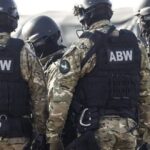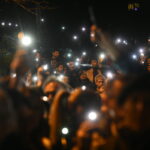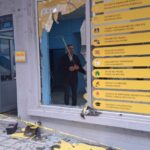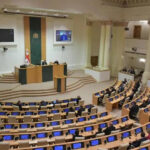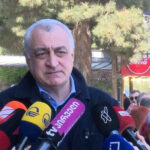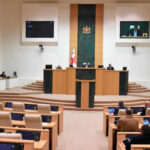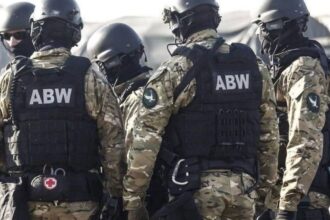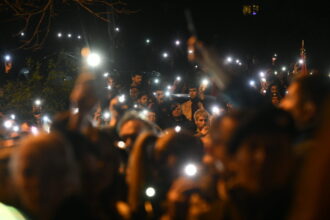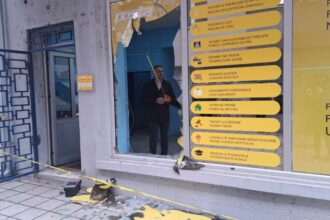* Nowhere in Lebanon feels safe, say people from Beirut Published at 09:28 British Summer Time09;28 BST Image Source, Reuters Image caption: Mohamed Gradi warns that the’situation only gets worse’ 15 days after Israel’s ground operations in Lebanon. We have just shown you photos from Beirut – we can now give you quotes from people who live there. Mohamed Gradi, aged 57, claims that there is no place in Lebanon where people feel secure. He tells Reuters, “You see people being displaced and not being able to find a place to stay.” “[People] were displaced from the south – from Dahieh, [Beirut suburbs in the south], from Bekaa and even from areas where our Christian neighbors lived. They too, were displaced.” Mostafa Salih, 48, who was displaced, believes that Israel’s airstrikes could increase Hezbollah support. “If they think they can scare away the supporting environment [of Hezbollah] in this way, on the contrary…look us…we are living not as human beings but as homeless.” Share page About sharing
* In pictures: Displaced People Start the Day on Beirut Streetspublished at 09:19 British Summer Time09;19 BSTMore that 1.2 million people in Lebanon have been displaced since Israel increased its air strikes last week, according to the Lebanese Government. Many people have fled the southern towns and villages to move north to the capital. These images show displaced people sleeping on rugs or in makeshift shelters in central Beirut. Image source: Reuters Image Source: Reuters Image Source: Reuters Share page about sharing
* Israel says aid to Gaza ‘falls in the wrong hands’ published at 08:49 British Summer Time08;49 BSTYolande KnellMiddle Eastern correspondent, in Jerusalem This morning an Israeli minister strongly defended Israel’s policy and record in Gaza. Amichai Chkli, minister of diaspora affairs and member of the Likud party of the prime minister, told Israeli public radio that the Biden administration’s policy to apply massive pressure to the humanitarian issue was misguided and would ultimately force us to prolong the fight. Humanitarian aid is often misdirected. The practice of a blocking force that allows civilians the freedom to move into safe areas is also in compliance with international law. “Unfortunately, there seems to be also internal American considerations in play.” Israel accuses Hamas for diverting aid away from those in Gaza who need it. Many commentators point out that the US letter leaked just before the presidential elections amid Democratic voter pressure on the war. Share page About sharing
First aid to northern Gaza in two weeks published at 08:25 British summer time08:25 BSTYolande KnellMiddle Eastern correspondent, in Jerusalem After a strongly-worded letter from the US to Israel, urging Israel to increase aid access to Gaza or risk losing some US military aid, the first aid to northern Gaza in two weeks arrived. A UN official told me that 28 lorry loads of flour for bakeries, and one fuel lorry entered the main northern crossing Sunday. He tells me that yesterday, 30 lorries had been sent to the crossing but only 12 of them were loaded with aid. This was due to delays in the route and the processing. More aid is expected to enter the northern crossing and from Jordan today. Washington has demanded that Israel guarantee that this route into Gaza will be fully operational. Share page About sharing
* Iran warns that it is prepared to respond to any Israeli attackspublished at 07:53 British Summer Time07;53 BST Image Source, EPA Image caption: Iranian Foreign Minister Abbas AraghchiAs Israel continues to strike Gaza and Lebanon, the region waits to find out how or when it will attack Iran. Iran launched nearly 200 missiles at Israel on 1 October. Most of them were intercepted. Benjamin Netanyahu, Israel’s Prime Minister, said at the time that Iran would “pay for it” – but no military response has yet been made. Iran’s Foreign Minister spoke to UN Secretary-General Antonio Guterres last night and said that Iran is ready to respond to any attack by Israel. Abbas Araghchi, the Iranian Foreign Ministry reported, said that Iran, while making every effort to protect the peace, security and stability of the region is ready to respond to any adventure by Israel with a regretful and decisive response. What might Iran do if Israel responded? Share this page about sharing
What might Iran do if Israel responded?
* As Israeli strikes continue, there are no assurances for the people of Beirutpublished at 07:30 British Summer Time07:30 BSTNafiseh KohnavardMiddle Eastern correspondent, BBC World Service in Beirut. The air strikes in Beirut this morning were less than 24 hours after Lebanese Prime Minister Najib Mikati said to Al Jazeera that US had given “some sort of a promise” that Israel would deescalate its actions in Beirut and suburbs. In the same hour that the interview was broadcast, Israeli drones flew low over Beirut and Israeli jets created sonic explosions that sounded just like real explosions. There were anonymous quotes from US and Israeli officials, as well as Lebanese ones, about “a guarantee that attacks on Beirut and the southern suburbs would stop”. Even Israeli media reported Prime Minister Benjamin Netanyahu had ordered the pause following a conversation with US President Joe Biden. Netanyahu denied this, but some Israeli channels cited unidentified officials as saying that an agreement had been reached. Israel has claimed that its air force attacked an underground Hezbollah weapon site. The strikes, whoever the target, sent a clear message that Beirut and the southern suburbs of the city are not immune to Israeli attacks. The people of Beirut are now back to square one, with PM Mikati’s words disappearing in the air. Image source: Reuters Image caption: Displaced people from Beirut in a school that has been turned into a shelter Share page about sharing
* In Gaza, Israel says it kills Hamas commander and more than 50 ‘terrorists’published at 07:07 British Summer Time07:07 BSTWhile attacking Lebanon from the air and the ground, Israel’s war in Gaza, further south, continues. In an update published this morning, Israel’s military said it killed a Hamas commander of a drone unit in an airstrike over the northern Gaza Strip. The Israeli military says that the commander, Mahmoud Al-Mabhouh was responsible for drone attacks against Israeli territory. Hamas has not yet commented. Israel says that its military also killed more than 50 terrorists in the Jabalia region of Gaza during “close-quarters battles and aerial attacks”. Hamas’ Gaza-based health ministry reported on Tuesday that Israel has killed 42,344 Palestinians in Gaza since October 7. Yesterday, the US gave Israel a deadline of 30 days to increase humanitarian aid in Gaza. If not, some US military assistance could be cut off. Image source: Reuters Image caption: Palestinians inspecting the damage at the scene of an Israeli strike against a tent camp housing displaced people on Tuesday in Khan Younis in the southern Gaza Strip Share page About sharing
Middle East correspondent in Beirut, Go Bachega. This is the first attack by Israel on Beirut in almost a week. Images on TV showed plumes from two locations in Dahieh where Hezbollah traditionally has a strong presence. The attack took place at around 07:00 local (05:00 BST), an hour after Israel had issued an evacuation order that only mentioned one building. The Israeli military claimed that it had targeted a weapons storage facility underground used by the group. Israel has heavily bombarded this area of the city in recent weeks. There was a pause of several days in the attacks on Beirut. This was reportedly due to a request from the Biden administration. The lull in the strikes allowed residents to return home to Dahieh and inspect their homes while shopkeepers collected their goods. The last strike in Beirut occurred on 10 October when two strikes were carried out in a densely-populated area near the centre of the city. 22 people died. An entire building collapsed. The attack was without warning and the Israeli military has not commented. Image source: EPA Image caption: Thousands of people have been displaced from Beirut – the woman pictured yesterday is sleeping in a tent in the street. Share page about sharing
The Lebanese authorities reported that at least 18 people were killed in the country before the raids on Beirut. Five people were killed by the Lebanese Public Health Ministry in Riyaq in the Bekaa Valley, east Lebanon. The ministry also reports that five more people were killed in Srebbine, and three others in Touline in the south. According to the health minister, a series strikes in Qana near Tyre, south of the capital, resulted in one death and 30 injuries. The state-run news agency claims that the death toll may be as high at 10. The civil defence authority reports that four people died in Mazra’at Mehref in the south. Share page About sharing
* Israel says it targeted Hezbollah weapons hidden undergroundpublished at 06:39 British Summer Time06:39 BST Image source, Reuters Early this morning, Beirut was awoken by Israeli air strikes in the southern suburbs. These came after Israel issued its first Dahieh evacuation order in nearly a week, ordering residents to leave one location in Harek Hreik. After bombarding the city with daily strikes and issuing dozens of evacuation orders, Israel paused strikes on Beirut last week – though its ground operation in southern Lebanon, and air strikes on the rest of the country, continued. The last Israeli strike on Beirut – on 10 October – killed at least 22 people and injured 117 more, according to the Lebanese health ministry. The Israeli military says its strikes this morning targeted Hezbollah weapons stored in an underground warehouse. Share page About sharing
* Israel strikes Lebanon’s capital for first time in five dayspublished at 06:36 British Summer Time06:36 BSTGood morning from London, where we are restarting our live coverage of the conflict in the Middle East. Overnight, Israel carried our air strikes on the southern suburbs of Lebanon’s capital, Beirut. It’s the first time the capital has been targeted in nearly a week. Israel said it hit an underground warehouse used by Hezbollah to store weapons. Meanwhile, it says 50 rockets were launched towards the northern Israeli town of Safed overnight. The strikes in Beirut came after Lebanese authorities reported that Israeli air strikes killed people across the east and south of the country – we’ll have more on that soon. Further south, Israel’s war in Gaza continues – on Tuesday, the US wrote to Israel, giving it 30 days to boost humanitarian aid access in Gaza or risk having some US military assistance cut off. Stay with us as we bring you the latest news and analysis from our teams across the region. Share page About sharing
* US gives Israel 30 days to boost Gaza aid or risk cut to military supportpublished at 20:50 British Summer Time 15 October20:50 BST 15 OctoberWe’re pausing our live coverage for today, but before we go here are the latest headlines from across the Middle East: The US has warned Israel it has 30 days to increase access for humanitarian aid into Gaza or risk a reduction in some military aid It comes as food aid was delivered into northern Gaza for the first time in two weeks, with the UN describing the situation as “desperate” The US has also said that components for an advance anti-missile system have begun arriving in Israel, with the Pentagon saying the system is intended to help Israel defend itself and will be operational in the “near future” An Israeli police officer was killed when a gunman opened fire – four other people were injured In Lebanon, the country’s health ministry and local media report an Israeli strike in Riyaq, in the Bekaa Valley region in eastern Lebanon, killed five people, including three children As a reminder, within days of Israel launching its war in Gaza last October, two Palestinians began filming their daily lives for the BBC – Aya and Khalid’s stories are featured in a new BBC World Service and Storyville documentary, Life and Death in Gaza, which you can watch on BBC iPlayer. We’re now pausing our live coverage until the morning, the news desk will continue to cover the latest on the conflict. Share page About sharing
* The US has warned Israel it has 30 days to increase access for humanitarian aid into Gaza or risk a reduction in some military aid
* It comes as food aid was delivered into northern Gaza for the first time in two weeks, with the UN describing the situation as “desperate”
* The US has also said that components for an advance anti-missile system have begun arriving in Israel, with the Pentagon saying the system is intended to help Israel defend itself and will be operational in the “near future”
* An Israeli police officer was killed when a gunman opened fire – four other people were injured
* In Lebanon, the country’s health ministry and local media report an Israeli strike in Riyaq, in the Bekaa Valley region in eastern Lebanon, killed five people, including three children
* Lebanon is paying the price for Hezbollah – Israeli presidentpublished at 20:45 British Summer Time 15 October20:45 BST 15 October Image source, EPA Israeli President Isaac Herzog visited the northern cities of Haifa and Kiryat Bialik today and warned Lebanon that it is “paying the price” for the actions of Hezbollah. Both areas have been hit by Hezbollah rockets and drones in recent weeks. Four Israeli soldiers were killed and 58 injured in a drone strike targeting an army base near Haifa on Sunday. A statement from the president’s office said Herzog visited a medical centre in Haifa where he met soldiers injured during the fighting in Lebanon. “Hezbollah has been threatening Haifa and this vicinity all throughout and yet, the people of Haifa are strong, resilient,” Herzog said, according to the statement. “The world should understand that we’ve offered, time and again to reach an amicable solution on the border with Lebanon. Unfortunately, Hezbollah refused time and again.” “Let me tell the people of Lebanon: you are paying the price for a vicious regime of terror headed by Hezbollah,” he continued. “Instead of a good, decent life for a country that was once the pride of the Middle East, Lebanon, now you’re paying the price, and the price is getting heavier and heavier.” Share page About sharing
* Netanyahu tells Macron he is opposed to unilateral Lebanon ceasefirepublished at 20:40 British Summer Time 15 October20:40 BST 15 October Image source, EPA Image caption, A file photo of Macron and Netanyahu meeting in 2023Israeli Prime Minister Benjamin Netanyahu is opposed to agreeing to a “unilateral ceasefire” in Lebanon, a statement from his office says. The statement says he told French President Emmanuel Macron during a call earlier that a unilateral ceasefire would not change the “security situation” and only “return it to the way it was”. It says he told Macron that Israel would not agree to any arrangement that does not stop Hezbollah from rearming and regrouping. The remarks come as Macron pressures Israel to abide by UN resolutions that include ending its occupation of Palestinian territories, telling his cabinet that “Mr Netanyahu must not forget that his country was created by a decision of the UN”, a participant in the meeting told the AFP news agency. Share page About sharing
* Five dead, including 3 children, in Israeli strike on Lebanon, health ministry sayspublished at 20:33 British Summer Time 15 October20:33 BST 15 OctoberFive people, including three children, were killed in an Israeli attack on Riyaq, in the Bekaa Valley region in east Lebanon, earlier today, according to the Lebanese health ministry and local media. Sixteen people were also reported to be injured. Israel has not yet commented. Share page About sharing
* ‘One of the worst scenes we’ve witnessed’published at 20:27 British Summer Time 15 October20:27 BST 15 OctoberWarning: This post contains details which some may find upsetting Image source, Reuters The BBC has heard harrowing recounts from witnesses to an Israeli air strike and resulting fire at a tent camp in a Gaza hospital compound in Deir al-Balah in the early hours of Monday. One mother called it “one of the worst scenes we’ve witnessed”, while an injured girl said she heard screaming as people tore down their tent to get them out. A man said he had “broken down” as he was “unable to do anything” to help those who burned to death. The strike killed four people and injured dozens of others. The BBC has verified the location of a video that shows what appears to be a person on fire. Other footage captures people rushing to extinguish the flames amid screams and explosions sending fireballs into the night sky. The Israeli military said it had targeted Hamas fighters operating inside a command centre in the car park. It said a fire broke out “likely due to secondary explosions”, and that the incident was under review. Read more here Share page About sharing
* Read more here
* In Pictures: Israeli strikes on Gaza continuepublished at 20:03 British Summer Time 15 October20:03 BST 15 OctoberAs we’ve been reporting, the UN has condemned the “large number of civilian casualties” in Gaza in recent days. Israel says it is targeting Hamas. The images below show the situation on the ground in the aftermath of recent Israeli strikes. Image source, Getty Images Image caption, People attempt to rescue a man from the rubble in Jabalia, northern Gaza Image source, Getty Images Image caption, Jabalia, Gaza Image source, Getty Images Image caption, A tented camp for displaced people next to a hospital in the central Gazan city of Deir al-Balah was struck by Israeli forces on Sunday Share page About sharing
* Israel says it arrested Hezbollah elite forcespublished at 19:54 British Summer Time 15 October19:54 BST 15 OctoberThe Israeli military says it had arrested three members of the Lebanese Hezbollah’s elite Radwan forces, adding that they had been moved to Israel for investigation. “An underground shaft was located inside a building used by Hezbollah. The forces surrounded the building, where three terrorists of the Radwan Force were entrenched,” the military said in a statement, external, referring to the group’s elite units. “They were found alongside many weapons and equipment needed for a long stay.” Share page About sharing
* US plays game of carrot and stick with Israelpublished at 19:44 British Summer Time 15 October19:44 BST 15 OctoberWyre Daviesreporting from Jerusalem A rather oddly choreographed game of “carrot and stick” is currently being played out in what, for weeks, has been an increasingly frosty relationship between the US government and Israel. The rapid deployment of the American THAAD high-altitude anti-missile defence system to Israel complete with around 100 US personnel to operate it demonstrates Washington’s continued military commitment to Israel. The system would form part of Israel’s defensive shield, should the conflict with Iran escalate into something much bigger. But it is also a reminder of how reliant Israel is on US military support, even though Benjamin Netanyahu repeatedly says Israel will make its own military decisions how and when it sees appropriate. What clearly isn’t appropriate, according to the unprecedentedly strong language in a joint letter from the US Secretaries of State and Defence to their Israeli counterparts, is how Israel is prosecuting the war in Gaza. For just over a week, the IDF has been attacking parts of northern Gaza hard. The area, which incorporates the Jabaliya refugee camp, may be hiding the remaining Hamas units that Israel is keen to neutralise, but it is also home to around 300,000 people – many of whom have already had to flee their homes during this war. The humanitarian consequences of Israel’s attacks – in which at least 300 people have been killed – are appalling, say aid agencies. Thousands of people are trapped with barely any food or medical aid getting in and, in reality, there are no safe spaces to escape to. And that has brought a co-ordinated chorus of condemnation, not just from a collective group of aid agencies but international governments as well. The Americans have now made the continued supply of weaponry and arms to Israel conditional on a change in the humanitarian situation in Gaza. That is an almost unprecedented warning from Washington – at least in the context of this war. Whether it causes Israel to rethink what some had described as a “scorched earth” offensive in northern Gaza remains to be seen. Share page About sharing
* IDF says UN Gaza clinic ‘taken over by terrorists’published at 19:34 British Summer Time 15 October19:34 BST 15 OctoberThe Israel Defense Forces (IDF) says one of its divisions has “eliminated dozens of terrorists” and “confiscated numerous weapons” hidden inside a medical clinic run by UNRWA – the UN’s agency for Palestinian refugees – in Jabalia, north Gaza. In a statement on X, the IDF says the clinic was “turned into a weapons storage facility” and hideout. “Terrorists” who had barricaded themselves inside shot at Israeli soldiers from the 162nd Division but have been “eliminated”, it adds. “Following the elimination of the terrorists, numerous secondary explosions were observed, indicating a hidden weapons stockpile.” Following the 7 October attacks last year, Israel alleged that more than 450 UNRWA staff were members of terrorists groups. The UN agency, which employs more than 13,000 people in Gaza, later fired nine employees after an investigation found they may have been involved in the Hamas-led incursion. Image source, IDF Image caption, The IDF says they recovered numerous weapons from the clinic in Jabalia Share page About sharing
Palestinians inspect the damage at the site of an Israeli strike on a tent camp sheltering displaced people in Khan Younis, in the southern Gaza Strip, on Tuesday
Read More @ www.bbc.com
